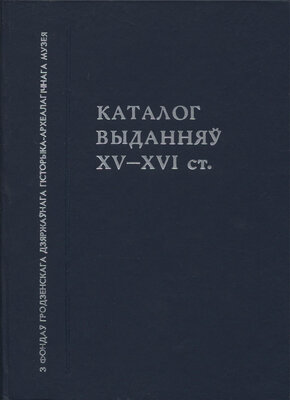Каталог выданняў XV-XVI стагоддзяў
Выдавец: , Слонімская друкарня
Памер: 232с.
Слонім 2003
Некаторыя асаблівасці Каталога спецыяльных тлумачэнняў не патрабуюць.
У канцы Каталога пададзены паказальнікі: імянны, друкароў і выдаўцаў, уладальнікаў і паказальнік надпісаў.
Імянны паказальнік мае спасылку на апісанне (парадкавы нумар), у якім гэта асоба ўзгадваецца. У паказальніку друкароў і выдаўцаў імёны іх пададзены па геаграфічнай назве (горада) у алфавітным парадку. Паказалы-іік уладальнікаў кніг складзены на аснове ўладальніцкіх адзнак: экслібрысаў, штампаў, пячаткаў, подпісаў, дарункавых запісаў. Паказальнік уладальніцкіх надпісаў падае ў алфавітным парадку ўсе расчытаныя і нерасчытаныя да канца надпісы ад рукі з надзеяй, што даследчыкі старадрукаў і ўладальнікі прыватных калекцый дапамогуць нам устанавіць некаторыя нерасчытаныя або не ўстаноўленыя прозвішчы.
Мы будзем удзячны за любыя карысныя заўвагі па зместу каталога.
В. 1. Шоцік
Introduction
We would like to offer you the catalogue of the XV - XVI centuries editions of Hrodna State Historical-Archaeological Museum's funds. This catalogue is the first scientific description of23,000 museum's collection of books, its oldest and worthiest part: incunabula, palaeotypes and the editions ofthe second half of the XVI century.
The Museum’s library was collected in 20-30s ofthe XX century due to Jozef Jodkowski (1890-1950), the famous archeologist, and historian of Art, who was born in Hrodna. Jodkowski was the Museum’s of History and Art founder and its first director (1922-1937). He enriched the Museum’s funds every day collecting its future exhibits, the subjects of material and spiritual culture of Neman's Region. Moreover he really protected them from devastation and loss during Hard Times (1914-1920) often collecting them in abandoned destroyed houses and institutions or picking out the books for example from Jewish stores where they were used as a packing paper. He searched for the lost cloisters’ and churches’ libraries, often obtained books proving in court that national values must be kept in the Museum. J.Jodkowski could save almost 1,000 volumes of the most valuable old printed books collection of Hrodna Dominican Cloister. They are the most interesting part of our books collection now.
The substantial addition to the museum’s books collection was the library of Marta Krasinska who belonged to Puslowskies family. The countess presented her library to the town of Hrodna and personally to its representative - the
Museum. 10,000 volumes of editions of the end XV - beginning XX centuries, including incunabula, palaeotypes, French Enlighteners’ contemporary editions, famous historians’ and naturalists’ monographies, periodicals from Vilna, Cracow, Moscow, Paris, binded into great volumes were brought on wagons to Hrodna from Svislach by Jozef Jodkowski in autumn 1921.
Very interesting collections consist of books from the libraries belonged to different famous families of counts Potockies: Mniszchics, Bruls, Kazimierz Kontrym - the secretary of Vilna University Council, librarian and publicist, Konstancja Rzewuska - Austrian Empress court lady, Andrzej Stanislaw Zaluski -the Great Chancellor of Korona. Bishop of Cracow, Juzaf Stanislau Sapieha - Referendary of Grand Duchy of Lithuania, suffragan and parson of Vilna, Mikalaj Morawski the member of Great Lithuanian Council, dominican priests Dominik Siwicki, Hilary Pomian, Hilarion Piskowski, the other private libraries and the libraries of cloisters, churches and other institutions. Every collection has its own history.
During the pre-war years according to the statements of some researchers the library included 40,000-45,000 volumes of editions in Latin, Ancient Greek, Old German, French, Polish, Old Slavonic and other languages in different fields: Philosophy and History. Theology and Medicine, Canon and Civil Law, Natural and Exact Sciences.
The fate of this library is dramatic. Despite its survival in war it was halfdestroyed in 50-es of XX century by the ChiefLit as it didn’t suit the ideology existing in the Soviet State. The valuable editions were taken to the mackle- paper stocks or just stolen. Considerable parts of books collection with the stamp “Muzeum w Grodnie” are now in Minsk, in the National Belarusian library, in Vilna, in Bialystock. The rest of books were taken into a hall of Hrodna Old Castle and had been kept there without the appropriate conditions for more than 50 years.
In 1991 our museum obtained the rooms of Hrodna New Castle for its funds and the appropriate halls were given for keeping books there. The books were
registered, cleaned and some of them were mended. Administration of Culture ordered to establish Rare and Old-Printed Books Department in Hrodna Historical-Archaeological Museum. The Department scientific workers started studying the books collection, making catalogue involving it into scientific researches.
In spite of some losses the collection of books is still rich and interesting for its contents, persons it belonged to, printed peculiarities. For example there are editions of the first famous publishers of Europe: Aldo Manuzio and Lasarus Soardus from Venice, Hieronimus Froben, Johannes Oporinus and Robertus Winter from Basel, Jan Haller from Cracow, Plantins from Antwerp, Estienne from Paris, Elsevires from Holland etc.
This books collection is enriched with contemporary editions of either famous or forgotten in the course of time scientists, religious and civil persons of different European countries: Jan Glogowczyk (? - 1507) - the outstanding mathematician, philosopher and theologist; Martin Luther (1483- 1546)-the famous Church’s reformer, Protestantism’s founder; his opponent - German theologist Johannes Eck (1486 - 1543); Florence scientist Joannes Despauterius (1460 - 1520); Polish physician and botanic Marcin Siennik (?- 1590), etc.
There are also especially interesting editions of Reformation period, great anticlerical and antifeudal movement in Europe. Many outstanding civil persons and scientists were the followers of this movement. They published books themselves, wrote prefaces and commentaries. Among them there are names connected with editions of our books collection: Otto Brunfelsius, Erasmus Roterodamus, Hans Lufft, Martin Luther, Udalrichus Zasius, Johannes Froben, Philip Melanchton, etc.
Johannes Ulrichus Zasius’ (1461 - 1535) work Institutionum de actionibus enarratio. Basileae: Apud Michaelem Isingrinium, [1536] with prefaceepitaph to the author written by his fellow-contemporaries Erasmus Roterodamus, Nicolaus Freigius, Gervasius Sopher is rare not only for collection of such names and printed perfection, but also for its survival from the fire of
inquisition. On the first page of this book there is written a word “Prohibitus”. There are lots of such editions that were taken into the famous "Index librorum prohibirorum” and were meant to be destroyed, but now they are in our funds: Johannes Augustanus Forster (1495 - 1553), Dr. of Theology, Wittenberg University professor Dictionarium Hebraicum novum. Basileae: Per Frobenium et Episcopium, 1564'. Mauserus Cunradus (1505? - 1548) Processus juris: una cum utilissima explicatione tituli institutionum de exceptionibus. Witebergae: [Excudebat Johannes Crato], 1569', Westhemer Barptolomaeus (XVI cent.) Conciliatio ac consensus sacrosanctae Scripturae, et Patrum ortodoxorum... Tiguri: Apud Andream Gesnerum, et Rodolphum Wyssenbachium, 1552, etc. Usually such books are taken from private libraries of High Clergy. And on the abovementioned book of Zasius there is a signature "Nicolaus Stephanus Pac Palatinus Trocensis”, the name of voevoda Trocki, later bishop ofVilna(1681 - 1684) Mikalaj Pac. There are also some books from the private libraries of Dominican priest Dominic Siwicki and Georgius Albinus, bishop of Vilna, etc.
Georgius Albinus had a very rare and valuable books collection. He was told to gather his collection bringing prohibited heretic books from everywhere. Bishop died on the 10th of May 1570 without having left the will. On the 12th of May Vilna Jesuit Academy was established and bishop Pratasiewicz on behalf of Vilna Capitula presented Georgius Albinus’ books collection to the Jesuits’ library on condition that heirs wouldn’t be found. The heirs might not have been found and Jesuits that started to form their famous library of Vilna Jesuit Board kept the books. And this particular book has come to Hrodna.
Our Museum’s books collection includes a big list of encyclopaedias; among them there is the first edition of Great French Encyclopaedia of d'Alembert and Didro. Encyclopaedical dictionaries in different fields, explanatory and foreign languages dictionaries published in Rome, Padua, Venice, Paris, Vienna, Basel, Leipzig, Berlin. Rotterdam, Cracow and other centers of European culture. These are multivolumed editions of History of almost all European countries, chronicles and biographies of many royal and other famous families.
heraldics, prefaces, devotions to the outstanding persons, memoirs, calendars, textbooks, the oldest of which was published in 1 507 in Venice.
This precious books collection shows that there were rich libraries in our region and there was a great interest and high cultural level of higher strata of society in XVI - XVIII centuries.
Bibliographical description of XV -XVI centuries editions was based on “The Rules of Making Bibliographical Description of Old Printed Editions. Moscow; 1989” and also on "The Book of Belarus. Summary Catalogue. Minsk, 1986" by H.Y. Halenchanka.
The descriptions are listed in alphabetical order according to the authors' (compilers') surname or unified title of the book. The editions of one author are also listed in alphabetical order. The titles of the works were abbreviated. The authors w hose names are toponyms or they are monks, or have high holy orders, are listed under their generally accepted names. The title is given in its original language, gothic letters in German and Polish are changed into modern. The text on the front page is given completely preserving orthographical and punctual peculiarities. Imprint (place of publication, publisher) is given in original form, in brackets the modern name of the town in its national language is given. Bibliography is not given as the editions are described "de visu” and only in case of the front page’s loss there is the source from which that edition was found. The personal notes that include the devotion signs, stamps, exlibrises, superexlibrises, personal names pressed on the book-cover are also given.
 КНІГІ ОНЛАЙН
КНІГІ ОНЛАЙН


